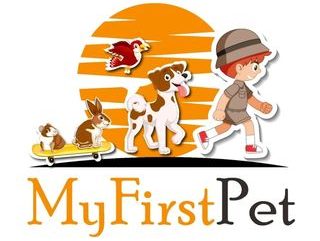- English
- 9704134919
- support@myfirstpet.in
Dogs and play – it’s a combination that brings joy to both dogs and their human companions alike. But have you ever wondered why dogs play? In this blog post, we’ll delve into the fascinating world of canine play behavior, exploring the reasons behind it and what it means for our furry friends.
Why Do Dogs Play?
1. Social Interaction: Just like humans, dogs are social creatures. Play provides them with opportunities to interact with other dogs and humans, helping them build and maintain social bonds. Through play, dogs learn crucial social skills such as communication, cooperation, and understanding social cues.
2. Physical Exercise: Play is a natural way for dogs to stay active and burn off excess energy. Whether it’s chasing a ball, wrestling with a friend, or running around in circles, play helps dogs maintain their physical fitness and overall health. Regular play sessions can help prevent obesity, promote muscle development, and improve cardiovascular health.
3. Mental Stimulation: Play is not only physical but also mental stimulation for dogs. It engages their brains, encourages problem-solving, and prevents boredom. Interactive toys, puzzles, and games like hide-and-seek challenge their minds and keep them entertained.
4. Instinctual Behavior: Play is deeply ingrained in a dog’s instinctual behavior. Many of the playful behaviors we see in dogs, such as chasing, pouncing, and wrestling, are reminiscent of behaviors seen in their wild ancestors. These behaviors served survival purposes in the wild, such as honing hunting skills and practicing self-defense.
What Does Play Mean for Dogs?
1. Happiness and Well-being: Play is a sign of a happy and healthy dog. When a dog is engaged in play, you can see their tail wagging, their eyes bright, and their whole body language exuding joy. Regular playtime contributes to a dog’s overall well-being and quality of life.
2. Bonding and Trust: Play strengthens the bond between dogs and their human companions. Through play, dogs learn to trust and feel safe with their owners. It’s a way for them to communicate affection and build a positive relationship based on mutual trust and respect.
3. Emotional Outlet: Dogs experience a wide range of emotions, just like humans. Play provides an emotional outlet for dogs to express themselves and release pent-up energy or stress. It’s not uncommon to see a dog engage in play after a particularly stressful or anxious situation as a way to cope and unwind.
In conclusion, play is an essential part of a dog’s life, serving as a means of social interaction, physical exercise, mental stimulation, and instinctual behavior. Understanding why dogs play and what it means for them allows us to provide the necessary outlets for their natural behaviors and ensure their happiness and well-being. So, the next time you see your furry friend chasing a ball or frolicking with their favorite toy, remember that play is not just fun – it’s an integral part of being a dog.
Contact Us
- 9704134919
- support@myfirstpet.in
- Visakhapatnam, Andhra Pradesh
Subscribe
Enter your email to receive our latest notifications
COPYRIGHT © 2024 MYFIRSTPET. ALL RIGHTS RESERVED.
Privacy Policy & Terms and Conditions
Shipping & Delivery Policy / Cancellation & Refund Policy

